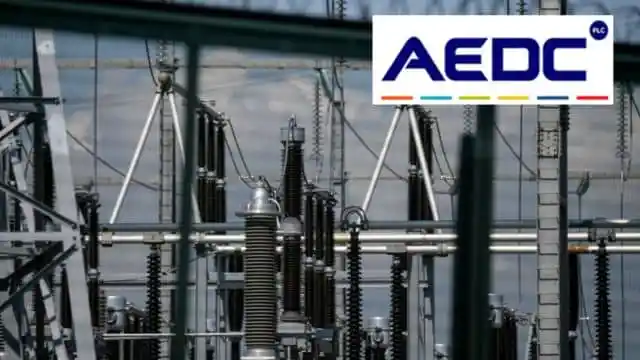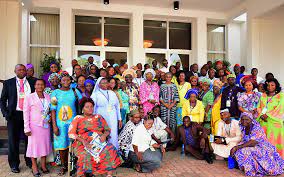economy
Nigerian Navy Reshuffles Appointments of 57 Senior Officers

By Gom Mirian, Abuja
The Nigerian Navy has reshuffled the appointments of top senior officers comprising 56 rear admirals and a Commodore.
In the redeployment, Rear Admiral Olusanya Bankole formerly the Director of Logistics, Defence Space Administration, is now appointed as the Chief of Communications and Information Technology, Naval Headquarters while Rear Admiral Alexander Bingel formerly Director Combat Policy and Tactics is now the Director of Logistics, Defence Headquarters.
Also, Rear Admiral Ibrahim Dewu, formerly Director Project Implementation, Monitoring and Evaluation Directorate, Naval Headquarters is now the Chief of Defence Civil Military Cooperation, Defence Headquarters while Rear Admiral Kennedy Ezete formerly Director Project Monitoring, Defence Headquarters resumes as the Chief of Administration, Naval Headquarters.
Others are Rear Admiral Livingstone Izu who was the Director Manning at Naval Headquarters is the new Chief of Logistics, Naval Headquarters while Rear Admiral Musa Madugu formally Deputy Director Special Operation Forces at the Defence Headquarters has been appointed as the Admiral Superintendent Naval Ordinance Depot. Rear Admiral Daupreye Matthew, the erstwhile Director of Innovation and Concept Development, Naval Headquarters is now the Director of Training, Defence Headquarters while Rear Admiral Zakariya Muhammad, the former Director of Training, Naval Headquarters has been reappointed Chief of Training and Operations. Rear Admiral Emmanuel Nmoyem has been reappointed Director Human Rights Desks at the Defence Headquarters while Rear Admiral Ibrahim Shettima formerly Flag Officer Commanding Central Naval Command moves to Defence Headquarters as Director of Plans.
While the former Director of Plans, Naval Headquarters, Rear Admiral Monday Unurhiere has been appointed the Chief of Defence Admimistration at the Defence Headquarters while Rear Admiral Hamza Kaoje who was the Director Equipment Standardization and Harmonization, Defence Headquarters has been appointed Group Managing Director, Navy Holdings Limited. Rear Admiral Sulaiman El-ladan who was the Chief of Naval Engineering, Naval Headquarters is now at the Defence Research and Development Bureau at Defence Headquarters as the Director Marine Research while Rear Admiral Idi Abbas formerly Director of Operations, Naval Headquarters is now reappointed Chief of Naval Safety and Standards.
Meanwhile, Rear Admiral Mohammed Abdullahi, the immediate past Director Communications at Naval Headquarters takes over as the Flag Officer Commanding Western Naval Command while Rear Admiral Saheed Akinwande formerly the Commandant Naval War College Nigeria has been appointed Director Operations, Naval Headquarters.
Others are: Rear Admiral Istifanus Albara formerly the Head ECOWAS Maritime Security Coordination Centre, Abidjan moves to Naval Headquarters as Navy Secretary while Rear Admiral Clement Atebi has been reappointed to Naval Headquarters as the Director Audit. Rear Admiral Samson Bura formerly Director Search and Rescue, Defence Headquarters is now the Director of Logistics at the Defence Intelligence Agency while Rear Admiral Umar Chugali formerly Director Cyber at the Defence Space Administration takes over as the Flag Officer Commanding, Central Naval Command. Rear Admiral Oluwole Fadeyi has been reappointed Director Record Returns and Analysis, Naval Headquarters, likewise Rear Admiral Olusola Oluwagbire reappointed Flag Officer Commanding Eastern Naval Command.
According to the Naval spokesperson, Commodore AO Ayo- Vaughan on Thursday in a statement released in Abuja, the new postings also saw Rear Admiral Eugenio Ferreira reappointed Commander Operation DELTA SAFE, Rear Admiral Mustapha Hassan formerly Director of Policy, Naval Headquarters redeployed to Naval War College Nigeria, Calabar as the Commandant while Rear Admiral Baratuaipri Iyalla formerly Chief Staff Officer, Logistics Command reappointed Flag Officer Commanding Logistics Command, Oghara.
Also, Rear Admiral Kohath Levi formerly Chief Staff Officer Naval Doctrine Command resumes at Naval Headquarters as the Chief of Naval Engineering while Rear Admiral Bashir Mohammed formerly Chief of Logistics, Naval Headquarters is now the Director Project Monitoring, Defence Headquarters. Rear Admiral Julius Nwagu formerly Director Campaign Planning, Naval Headquarters is now appointed Commandant Defence Intelligence College. Meanwhile, Rear Admiral Patrick Nwatu has been reappointed Flag Officer Commanding Naval Training Command while Rear Admiral Mike Oamen who was the Director Veterans Affairs, Naval Headquarters is now the Chief of Naval Transformation at the Naval Headquarters.
While, Rear Admiral James Okosun has been reappointed Commandant Nigerian Navy Engineering College, Sapele, Rear Admiral Ayodeji Olugbode formerly Managing Director Admiralty Maritime Services Limited takes over as Hydrogragher of the Nigerian Navy while Rear Admiral Abolaji Orederu formerly Director of Ships Design and Acquisition at the Naval Headquarters has been appointed as the Admiral Superintendent Naval Dockyard Limited, Victoria Island, Lagos.
“The immediate past Commander Naval Drafting, Rear Admiral Habilla Zakaria resumes Headquarters Naval Doctrine Command as the Flag Officer Commanding while Rear Admiral Suleiman Abdullahi, formerly Managing Director Navy Exchange Limited is now the Director of Logistics, Defence Space Administration at the Defence Headquarters.
“The erstwhile Chief of Accounts and Budget, Naval Headquarters, Rear Admiral Kasimu Bushi has been appointed Managing Director Navy Hotels and Suites Limited while the immediate past Flag Officer Commanding Western Naval Command, Rear Admiral Joseph Akpan resumes Naval Headquarters as the Chief of Policy and Plans. Rear Admiral Abdulmajid Ibrahim, former Director Peace Keeping Operations, Naval Headquarters is appointed Director Defence Transformation at the Defence Headquarters while Rear
“Admiral Olumuyiwa Olotu former Flag Officer Commanding Logistics Command takes over as the Commandant National Defence College, Abuja. Rear Admiral Ibrahim Shehu, formerly the Director Marine Engineering, Naval Headquarters is appointed Managing Director Navy Building and Construction Company Limited while Rear Admiral Abdullahi Ahmed who was Director of Recruitments Resettlement and Reserve, Naval Headquarters has been appointed Deputy Chief of Defence Space Administration at the Defence Headquarters. Rear Admiral Fredrick Damtong formerly the Director of Weapon Engineering, Naval Headquarters resumes as the Admiral Superintendent Naval Shipyard Limited. Meanwhile, Rear Admiral Abdul-rasheed Haruna has been reappointed as the Chief Staff Officer, Headquarters Eastern Naval Command while Rear Admiral Hamza Ibrahim who was Admiral Superintendent Naval Dockyard Limited has been appointed Managing Director Admiralty Marine Services Limited.
“Rear Admiral Sunday Oyegade, the outgone Admiral Superintendent Naval Shipyard Limited assumes office as the Director Project Implementation Monitoring and Evaluation at Naval Headquarters, Rear Admiral John Mamman is reappointed Chief Staff Officer, Headquarters Western Naval Command likewise Rear Admiral John Okeke is reappointed Chief Staff Officer, Headquarters Central Naval Command. Rear Admiral Olatunde Olodude, the former Fleet Commander Western Fleet resumes Naval Headquarters as the Director of Plans.
“The redeployment also affected Rear Admiral Peter Zakaria formerly Director of Arms, Naval Headquarters now appointed Chief Staff Officer, Headquarters Logistics Command and Rear Admiral Sunday Atakpa who is reappointed Chief Staff Officer, Headquarters Naval Training Command. Rear Admiral Abdul-hamid Baba-Inna, formerly the Director of Legal Services, Naval Headquarters is now Director of Administration, Naval Headquarters while Rear Admiral Patrick Effah, formerly Director of Maritime Domain Awareness, Naval Headquarters is now the Director of Naval Intelligence.
“Rear Admiral Abubakar Mustapha who was the Deputy Director Defence Affairs at the Office of the National Security Adviser assumes office as the Director of Training, Naval Headquarters while Rear Admiral Chidozie Okehie, the immediate past Director of Personnel Release at the Naval Headquarters takes over as the Deputy Commandant, Armed Forces Command and Staff College, Jaji.
“Rear Admiral Olusegun Soyemi, formerly the Director Monitoring and Evaluation Analysis, Naval Headquarters is appointed Director of Policy, Naval Headquarters while Rear Admiral Abraham Zipelle, formerly Commandant Defence Intelligence College now moves to Naval Headquarters as the Director of Manning. Furthermore, Commodore Omotola Olukoya who was the Commander Central Pay Office resumes as the new Chief of Accounts and Budget, Naval Headquarters.
economy
AEDC Restates Commitment to Pay all Legitimate Allowances to Staff

The Abuja Electricity Distribution Company (AEDC) says it is committed to settling all legitimate allowances owed staff.
The company’s Managing Director, Mr Chijioke Okwuokenye, said this in a statement in Abuja on Thursday following a threat from the workers to shutdown the operations of the establishment.
The threat notice was given by the two labour unions in electricity supply industry, the National Union of Electricity Employees (NUEE) and the Senior Staff Association of Electricity and Allied Companies (SSAEAC).
The unions had respectively resolved to resume their earlier suspended strike over non-implementation of agreements reached with the AEDC since Nov.
5 and Nov 7, 2024.The unions threatened to resume the suspended action over non-remittance of pension deductions for 16 months, non-implementation of the national minimum wage.
They also cited non-promotion and the continuous stagnation of members of staff for over 10 years, non-confirmation of staff on acting appointment, non-regularisation and proper placement of appointments amongst others.
Okwuokenye said that management had been engaging constructively with the union representatives regarding the notice of industrial action.
”We are committed to ensuring that all legitimate allowances owed to staff are settled promptly, subject to our financial processes and regulatory compliance.
”We have already initiated dialogue with the union leadership to address their concerns transparently and to seek a mutually agreeable resolution.
”We are confident that, through continued negotiation and open communication, we will find a way to avert any disruption to our operations and to uphold our commitment to the welfare of our employees, ”he said.
According to him, employees of AEDC are at the heart of all the company does, and their well-being and welfare are paramount to management.(NAN)
BUSINESS
NSIA Net Assets Hit N4.35trn in 2024
By Tony Obiechina Abuja
The Nigeria Sovereign Investment Authority (NSIA) yesterday disclosed that its net assets grew from N156bn in 2013 to N4.35 trillion in 2024.
Similarly, the Authority has remained profitable for 12 consecutive years, leading to cumulative retained earnings of N3.
74 trillion in 2024.Managing Director and Chief Executive Officer of NSIA, Aminu Umar- Sadiq made these disclosures at a media engagement in Abuja, highlighting its audited financial results for the 2024 fiscal year.
According to him, the results underscored the resilience of the authority’s investment strategy and the strength of its earnings, driven by a well-diversified revenue base and robust risk management practices, despite a challenging global macroeconomic and geopolitical environment.
Total operating profits, excluding share of profits from associates and Joint Venture (JV) entities, increased from N1.17 trillion in 2023 to N1.86 trillion in 2024, driven by the strong performance of
NSIA’s diversified investment portfolio, infrastructure assets, gains from foreign exchange movements, and derivative valuations.
In addition, Total Comprehensive Income (TCI), inclusive of share of profits from associates and JV entities, reached N1.89 trillion in 2024, reflecting a 59 per cent increase from N1.18 trillion in 2023.
Core TCI (excluding foreign exchange and derivative valuation gains) rose by 148 per cent to N407.9 billion in 2024 compared to N164.7 billion in 2023, supported by robust returns on financial assets measured at fair value through profit and loss, including collateralised securities, private equity, hedge funds, and Exchange-Traded Funds (ETFs).
Umar-Sadiq said the authority’s outstanding financial performance in 2024 reflected the “strength of our strategic vision, disciplined execution and unwavering commitment to sustainable socio-economic advancement.”
He said, “By leveraging innovation, strategic partnerships and sound risk management, we have not only delivered strong returns but also created value for our stakeholders
“As we move forward, we remain focused on driving economic transformation, expanding opportunities, scaling transformative impact and ensuring long-term prosperity for current and future generations of Nigerians.”
The CEO reaffirmed the authority’s commitment to managing the country’s SWF, and delivering the mandates enshrined in the NSIA Act.
He said NSIA remained poised to continually create long-term value for its stakeholders by delivering excellent risk-adjusted financial results, developing a healthy and well-diversified portfolio of assets and large-scale infrastructure projects, and enhancing the desired social outcomes.
He noted that NSIA was committed to its mandate of prudent management and investment of Nigeria’s sovereign wealth.
“In adherence to its Establishment Act, NSIA prioritises transparency, disclosure, and effective communication with all stakeholders and counterparties,” he said.
He pointed out that in the year under review, a new board, led by Olusegun Ogunsanya as Chairman, was appointed by President Bola Tinubu, in accordance with the provisions of the NSIA Act.
The new board will provide strategic direction and oversight, in addition to playing a pivotal role in critical decision making.
He remarked that under the guidance of the Board, the Authority will retain focus on its primary mandate of creating shared value for all stakeholders based on its continued adoption of corporate governance practices.
“NSIA prides itself an investment institution of the federation established to manage funds in excess of budgeted oil revenues and its mission is to play a pivotal role in driving sustained economic development for the benefit of all Nigerians through building a savings base for the Nigerian people, enhancing the development of the county’s infrastructure, and providing stabilisation support in times of economic misadventure,” he added.
economy
Firm Boosts Access to Dairy Nutrition with Affordable Peak Mini

From Anthony Nwachukwu, Lagos
Dairy brand, Peak Milk has boosted Nigerians’ accessibility to its quality dairy nutrition range with the introduction of the budget-friendly Peak Mini – a smaller, more affordable pack from its signature Peak Evaporated Milk.
Unveiling the dairy brand, the producer, FrieslandCampina WAMCO Nigeria PLC, restated its commitment to providing high-quality dairy products to consumers as it has been doing in over 70 years in Nigeria.
According to WAMCO, the Peak Mini evaporated milk will provide affordable breakfast within the reach of every home with a budget-friendly nutritional breakfast with the same rich, creamy taste and high-quality.
Senior Brand Manager of Peak Milk, Moninnuola Kassim, stated that with Peak Mini, the company is “directly addressing the challenges many Nigerians face daily, one of which is affordability.
“Our smaller, affordable Peak Mini packs ensure that quality dairy nutrition remains within reach for everyone, regardless of income level.”
According to her, “many consumers have had to compromise on nutrition when considering costs, but with Peak Mini, that trade-off is no longer necessary.
The brand, Kassim said, maintains the same premium taste and nutritional benefits in a convenient and cost-effective package, and whether for breakfast cereals, tea or other meals, this innovation ensures that consumers no longer need to choose between quality and affordability.
According to her, FrieslandCampina WAMCO believes that every Nigerian deserves access to quality, nutritious dairy products,” and “Peak Mini is another step towards fulfilling that mission by providing a practical solution that meets the needs of everyday consumers.”
| ReplyReply allForwardAdd reaction |





























